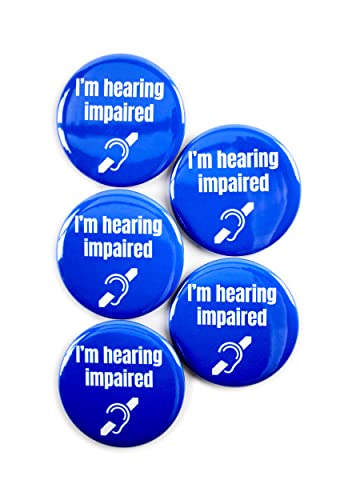Sharing your hearing loss with friends and family helps foster honesty, understanding, and support. It encourages open conversations and allows others to learn how to better communicate with you. Expect some initial surprise or questions, but be patient and reassuring. Over time, sharing strengthens your relationships, promotes empathy, and makes managing your hearing challenges easier. If you want to discover more ways to approach this important step, keep exploring how open communication can truly make a difference.
Key Takeaways
- Choose a comfortable, private setting to share your hearing loss openly and honestly.
- Explain your hearing challenges clearly and suggest ways they can support you.
- Prepare to address questions with patience, emphasizing that hearing loss doesn’t affect your love or relationships.
- Use visual cues, face the speaker, and minimize background noise to improve communication during conversations.
- Reassure friends and family that sharing your hearing loss fosters understanding, patience, and stronger connections.

Sharing your hearing loss with friends and family can feel intimidating, but opening up is an important step toward gaining support and understanding. When you tell loved ones about your hearing difficulties, you might be worried about their emotional reactions—fear of disappointment, frustration, or even pity. These feelings are natural, but they don’t have to define your experience. Instead, it’s an opportunity to foster honesty and connection. By sharing openly, you give others a chance to learn about your needs and how they can help you. This openness can ease the stress of communication, making interactions smoother and more enjoyable for everyone involved.
Opening up about hearing loss fosters honesty, understanding, and smoother communication with loved ones.
When discussing your hearing loss, it’s helpful to prepare some communication strategies. For example, you can suggest specific ways for your friends and family to support you better. Let them know if you prefer them to face you when speaking, reduce background noise during conversations, or speak more clearly. These practical tips let your loved ones understand how to adapt their communication style, which minimizes misunderstandings and frustration. It’s also good to remind them that your hearing loss isn’t a reflection of how much they matter to you; it’s simply a part of your life that requires some adjustments. Clear, honest conversations foster patience and empathy, making it easier for everyone to navigate daily interactions.
Initially, your loved ones might have emotional reactions—surprise, concern, or confusion. They may ask questions or seem unsure how to respond. That’s okay. Be patient and reassure them that your hearing loss doesn’t change your feelings for them. Share your experiences and explain how communication strategies can improve your interactions. Encouraging questions can turn initial discomfort into understanding. Furthermore, learning about mental health and emotional support can help both you and your loved ones cope with any feelings that arise. Remember, their reactions often stem from a desire to help and support you, even if they’re unsure how to do so at first.
Over time, opening up about your hearing loss can strengthen your relationships. When friends and family understand what you’re experiencing, they become more compassionate and patient. They’ll likely be more willing to adapt their communication styles and offer support when needed. This mutual understanding reduces feelings of frustration or isolation you might have felt before revealing your condition. Ultimately, sharing your hearing loss isn’t just about explaining a medical condition; it’s about building trust and creating an environment where everyone feels valued and understood. With honest conversations and effective communication strategies, you’ll find that your relationships thrive, and managing your hearing loss becomes easier with their support.

I'm Hearing Impaired Disability ID Aid Pinback Buttons – Disability Awareness Badges – Durable Round Metal Communication Aid – Clear Visibility Tool for Public & Social Situations – 2.25 Inch (5 Pack)
CLEAR, RESPECTFUL COMMUNICATION: These “I’m Hearing Impaired” pinback buttons offer a visible way for individuals with hearing impairments…
As an affiliate, we earn on qualifying purchases.
As an affiliate, we earn on qualifying purchases.
Frequently Asked Questions
How Can I Prepare Emotionally Before Sharing My Hearing Loss?
You can prepare emotionally by cultivating self-acceptance and building emotional resilience. Remind yourself that your hearing loss doesn’t define you, and that sharing your experience is a step toward understanding and support. Practice what you’ll say to feel more confident, and consider talking to a counselor or trusted friend beforehand. This helps you feel more grounded, so you can approach the conversation with openness and strength.
What Should I Do if Friends React Negatively?
If friends react negatively, stay calm and use coping strategies like expressing your feelings and setting boundaries. Remember, peer support can help you feel understood and less isolated. Share your experiences openly to foster empathy, and consider seeking support from others who’ve faced similar challenges. Over time, positive reactions can strengthen your relationships, and negative ones can become easier to handle with resilience and understanding.
How Do I Choose the Right Time to Tell Family?
Timing is everything, so don’t rush into telling your family before you’re emotionally ready. Consider their daily routines and choose a moment when everyone’s relaxed and open to conversation. Think about your own emotional readiness—when you feel confident and comfortable sharing. Picking the right time helps guarantee they’re receptive and supportive, making the conversation smoother. Trust your instincts and remember, it’s better to wait for the perfect moment than to force it.
What Are Common Misunderstandings About Hearing Loss?
Common misunderstandings about hearing loss include the myth that it only affects the elderly or that it’s a sign of weakness. You can bust these myths by sharing accurate information, which helps reduce stigma. Many believe hearing loss isn’t serious, but it impacts your communication and quality of life. Educating others promotes stigma reduction and encourages support, making it easier for you to manage your hearing health confidently.
How Can I Encourage Support From My Loved Ones?
You can encourage support by building trust through honest conversations and sharing your experiences. Let your loved ones know how hearing loss affects you and ask for their understanding. Keep communication open, and involve them in your journey. When they see your vulnerability and sincerity, they’re more likely to offer genuine support, making it easier for everyone to navigate challenges together and strengthen your relationships.

Audien Atom One OTC Hearing Aids – Wireless, Rechargeable, and Comfortable | Clear Sound in a Small, Discreet Design for Seniors & Adults with Hearing Loss
Hear What Matters Most: Hearing isn’t one-size-fits-all. That’s why our adjustable frequency system lets you personalize your sound…
As an affiliate, we earn on qualifying purchases.
As an affiliate, we earn on qualifying purchases.
Conclusion
So, after all that, you might find it funny how opening up about your hearing loss actually brings you closer to friends and family. Turns out, sharing your struggles can create stronger bonds—who knew? Instead of hiding it, you’ve given them the chance to understand and support you. Ironically, the very thing you feared might push people away could be what brings you even closer. Sometimes, being open is the best way to hear what truly matters.

Extra-Loud (110dB) Landline Phone for Seniors & Hearing Impaired – Hearing Aid Compatible, Large Button Corded Phone with 3 Photo Speed Dial, Speakerphone,Easy for Alzheimers Visually Impaired – Black
Easy Use, Clear Communication: This large button corded hone is specifically designed to help seniors and individuals with…
As an affiliate, we earn on qualifying purchases.
As an affiliate, we earn on qualifying purchases.

SuperEar Model SE5000 (PSAP) for Seniors – Hearing Amplifiers for Seniors, Super Ear Personal Sound Amplifier, Sound Amplifier Listening Device and Audio Accessories in 50dB Ambient Sounds Increase
COMPATIBILITY: Response to sound amplification is completely dependent on an individual's unique ability to detect sounds. For this…
As an affiliate, we earn on qualifying purchases.
As an affiliate, we earn on qualifying purchases.










